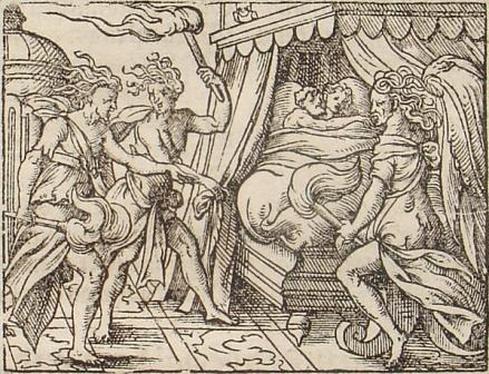An article had me thinking today. It is located at this address: https://classicalwisdom.com/mythology/monsters/worship-guilt-furies-justice/
Here’s what came to my heart and mind after recently writing about Saint Anselm in a previous post.
We live in a society bereft of the positive side of guilt, a guilt that is placed on everyone and allowed to be worked out with compassionate accompaniment. Yes, we have always heard that guilt is a bad thing, but is it? I’m listening right now to Richard Rohr’s book, Falling Upward. In it he describes how there are two phases to our lives, the first phase, the child phase, is before our own fall, meaning what we believed to be true in life before we had a really big wakeup call in the form of a hardship or death of a loved one. The second part of our life is the adult phase, the afterwards. I really think it should be described as three parts: The child, the hardship, and the adult. Because that hardship can last a long time. Also, there is still growth in the adult phase that circles us back through the process. But Richard Rohr puts it in this container to make it very simple for folks to follow along. The Before and After. He suggests that there is a benefit to “The Law” or having rules prior to one’s awakening.
Now I will jump to the guilt piece. It was thought that some amount of guilt is necessary for a society to function, that is if there exists a scape goat. In ancient Greece, there is a story about the Furies. The Furies are frightening monsters, females of course, that keep the order when atrocities are done. In Socrates book, The Furies and Justice, there is an argument to be made for limited guilt being necessary for courts to function. The mythology behind it is that Athena the Goddess asks to keep the Furies in Athens and offers them a deal to stay in Athens, that they will be worshipped as long as they keep to matters involving childbirth and the weather or the environment. Apparently, when they were loose, it was impossible to get anyone to serve on a jury in Athens because they feared making the wrong decision. So, if guilt is removed from the formula, society’s courts can deliver justice in the majority of the cases, or at least that’s the argument Socrates makes. But what this tells us that all the guilt was really put on all matters concerning women and the environment. It’s no wonder rape and violence became an issue of guilt for only women and not the perpetrator. As the Catholic church was grown from this culture, guilt stayed with the women and matters containing women.
Christianity brought guilt back to everyone; but, it wasn’t supposed to be in a bad way. It was supposed to be so that you had companionship and the comforting presence of Jesus to be with you while you looked at the things people did to you and the things you did. Remember that guilt belonged only to women in the greater culture, the overall secular culture; but Jesus brought it back to men and women to use to grow themselves into the adult phase (to use Rohr’s term) But as years went on, the greater culture seeped in, it was helped along by Saint Anselm with his release of atonement theory. This “Jesus died for our sins” mantra allowed men to outsource the consequence of their guilt to women and gave the men a sociably acceptable box to tie it up inside themselves. The church benefited because people stayed in the children stage, never examining their consciousness for the lessons of life, never having to confront their past behaviors, because Jesus just erased their life’s lessons rather than accompanying people through a retrospect of them. People lost track of this part of Jesus. Jesus died because of our sins and he forgives us because he loves us. But he also wanted us to follow him, follow the path he took, so we too can be raised. We have lost the ability to resurrect ourselves as long as we hang onto the old mantra, that Jesus dies for our sins. We stuff all that guilt down inside and soldier on. Because after all, what was the woman wearing? It becomes a judgement about he woman rather than a reckoning of a direct violent action. Courts have created a situation where we are judged and weighed against society rather than against what is right by God. Yes we need them but without a way for the majority to resolve their guilt and learn from their actions, bad behavior grows out of control. Jesus became tucked away in a sacrament where a priest forgave you and all you had to do was name it, but not actually sit with it in Jesus’ compassion, we only had to sit with it with an immediate kind of forgiveness from a third party who wasn’t at all helpful in walking us through, or prompting us to think, in a compassionate way about it. The same is true of the court system. It has turned into a game of winning rather than justice from those who are growing on their path to right thinking adulthood.
By maintaining the view that we just give it all over to Jesus, we are shut off from the benefit of resolving our guilt and becoming the adult that Rohr talks about. We lose the best tool, Jesus himself, for getting us to that next step of adulthood when we are in our dark night of the soul.
To summarize, two things had to happen, we had to remove guilt to a sacrifice, which was not Jesus, but women. Jesus was removed from the equation because we lost the message that he gave to us to follow him and he’ll be there with us as we work it all out. “Jesus died for our sins” as a mantra, has prevented society from growing into an adult. It keeps us indefinitely in the child state where we have compartmentalized our own guilt and were free to offload it onto women, as the culture of women carrying the guilt still persists today.
But what if we loosed the furies again? What if the furies actually kept society safe for everyone, by making people afraid to do violence if they are in the child state but allowing the guilt to leave us in the adult stage through the loving presence of Christ on our journey? What if instead of using women as the scapegoat, the overall violence that the furies were furious about was brought to light?








